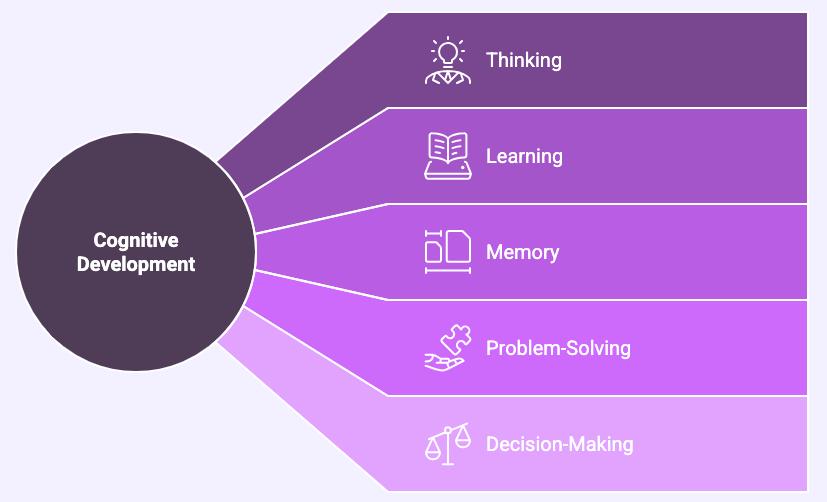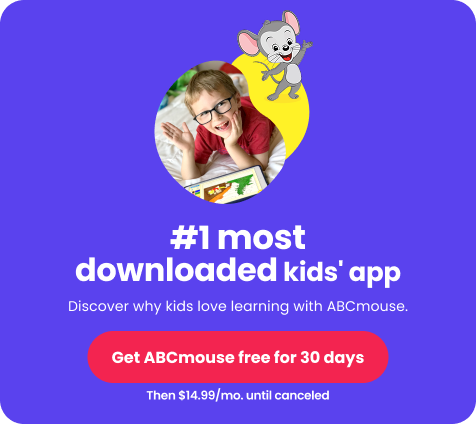
The Cognitive Benefits of Game-Based Learning
Experts say online learning games can boost memory, focus, and problem-solving in young children. Learn why digital learning works for kids.
Share
Your child’s cognitive development sets the stage for future learning, whether in the classroom or as they go through daily life.
Along with helping children learn social-emotions skills and foundational knowledge, research shows that online learning apps and games can enhance cognitive skills by improving working memory, focus, and critical thinking through interactive, goal-driven tasks. Discover why this approach to learning works well for young kids and how to incorporate it into your child’s routine.
What is Cognitive Development?
Cognitive development is how a person’s thinking, learning, memory, problem-solving, and decision-making abilities grow and change over time, especially during childhood. In other words, it’s how our brains learn to think.

Why is cognitive development important in early learning?
- It helps children understand their world, think critically, and solve problems.
- It supports language development, strengthens memory and attention, and plays a key role in academic success.
- It’s closely connected to social and emotional growth and contributes to a child’s overall well-being and lifelong learning.
Executive Functioning and Cognitive Development
Executive functioning controls the way our brains use cognitive skills. For example, memory itself is part of cognition. Working memory, in which we temporarily store information so we can recall and use it soon after, is an executive functioning skill. Both cognitive development and executive functioning skills expand dramatically in early childhood, especially during ages 2-5.
What is executive function?
Executive function refers to the cognitive skills that help people manage and control their thoughts, behaviors, and emotions. These skills are crucial for everyday tasks like planning and organizing, problem-solving, adapting to new situations, and maintaining focus.
How Online Learning Games Improve Cognitive Skills

Experts have found that game-based learning, including online learning games, offers significant cognitive benefits for young learners. As noted in a 2024 article published in the journal Children, “Digital devices can support cognitive development through educational games that promote problem-solving and critical thinking. These games often require children to follow complex instructions, make strategic decisions, and solve puzzles, which can enhance their cognitive flexibility and executive functioning.”
Here’s a closer look at the connection between online learning games and cognitive development.
Memory and Recall
Online games help players strengthen both long-term and short-term memory. Games often require players to remember information, characters, storylines, or game mechanics. Immersive online learning games make it easier for players to recall information later since they’re more likely to remember details from rich, engaging context.

“Educational apps and games that require children to remember sequences, patterns, or pieces of information can strengthen both short-term and long-term memory.“
According to a research article in Children, “Educational apps and games that require children to remember sequences, patterns, or pieces of information can strengthen both short-term and long-term memory. For instance, memory-matching games, commonly found in educational apps, require players to remember the locations of different items and can improve working memory capacity.” Tie in an educational element, such as matching colors to color names or sums to an addition equation, and foundational learning can occur at the same time.
Attention and Concentration
Anyone who’s ever tried to get the attention of someone wrapped up in a video game knows how focused players can become. Online games can train players to focus their attention on specific tasks while ignoring distractions, a crucial skill for learning and academic performance.

Online games can train players to focus their attention on specific tasks while ignoring distractions, a crucial skill for learning and academic performance.
Fast-paced and challenging games can improve attention spans and concentration levels, translating into better focus in real-world activities. “While excessive screen time is often linked to reduced attention spans, controlled and purposeful use of digital media can have the opposite effect,” noted the authors in Children. “Interactive tasks that require sustained attention and quick responses can help improve children’s attentional control and selective attention.”
Problem-Solving and Cognitive Flexibility
Many games involve solving puzzles, overcoming obstacles, or making strategic decisions, all of which enhance problem-solving abilities. Multiplayer games and games with complex narratives require the development of effective strategies to reach the ultimate goal. These benefits of game-based learning help children become more effective problem-solvers who can think creatively to find solutions.

“Online games can be designed to require children to think critically and creatively, solve problems, and adapt to new situations. These skills are essential for success…”
“Online games can be designed to require children to think critically and creatively, solve problems, and adapt to new situations. These skills are essential for success in today’s rapidly changing world and can help children develop into confident, independent, and resourceful individuals,” reported the authors of a 2024 paper in Frontiers in Psychology.
Engagement and Motivation
While some kids love learning for learning’s sake, many others need a little extra motivation to participate. The fun and engaging nature of online games can make learning more enjoyable and intrinsically motivating. Games can incorporate rewards and feedback mechanisms that provide instant reinforcement and motivate players to continue learning and improving.
“By providing a contextualized learning environment, digital educational games help students better understand and master knowledge, resulting in a livelier and more exciting learning process,” explain the authors of a January 2024 paper published in PLoS ONE.

“By providing a contextualized learning environment, digital educational games help students better understand and master knowledge, resulting in a livelier and more exciting learning process.”
“The positive impact of digital educational games on student learning engagement is amplified in a more immersive digital environment,” the authors continue.
How ABCmouse Can Support Cognitive Development

*Randomized control trial conducted by Age of Learning. PreK children used ABCmouse for at least 2 days/week and for at least 1 hour per week. Go to www.aofl.com/research for more information.
ABCmouse aims to support cognitive development in young children by combining research-backed learning principles with interactive game-based experiences that can enhance the following skills:
- memory
- recall
- attention
- problem-solving
- cognitive flexibility
Research also shows that using ABCmouse doubles early learning gains in reading and math.*
ABCmouse was specifically called out in a 2023 article in the journal Children, where the authors stated:
“Programs such as … ABCmouse utilizes adaptive learning techniques to keep students focused on tasks that are appropriately challenging, thus enhancing their ability to sustain attention over extended periods. These tools provide immediate feedback and rewards, which can motivate students to stay attentive and improve their focus.”
See what ABCmouse has to offer!

ABCmouse is a leading early learning program for children ages 2-8. Developed by master educators and classroom teachers, the program includes the following key academic subjects:
- Literacy
- Math
- Science
- Health
- Social studies
- Art
- Music
Designed to help children make educational gains, ABCmouse creates an engaging learning experience that includes these unique features:
- 10,000+ learning activities
- 850+ complete lessons
- Digital library, games, puzzles
- Customized learning paths
- Progress tracking
- Motivating rewards system
- Printables and coloring pages
Legal disclaimer: Any information, materials, or links to third-party resources are provided for informational purposes only. We are not affiliated with and do not sponsor/endorse these third parties and bear no responsibility for the accuracy of content on any external site. All information provided in this article is current as of May 2025.
References:
Clemente-Suárez VJ, Beltrán-Velasco AI, Herrero-Roldán S, Rodriguez-Besteiro S, Martínez-Guardado I, Martín-Rodríguez A, Tornero-Aguilera JF. Digital Device Usage and Childhood Cognitive Development: Exploring Effects on Cognitive Abilities. Children (Basel). 2024 Oct 27;11(11):1299. doi: 10.3390/children11111299. PMID: 39594874; PMCID: PMC11592547.
Alotaibi MS (2024) Game-based learning in early childhood education: a systematic review and meta-analysis. Front. Psychol. 15:1307881. Doi: 10.3389/fpsyg.2024.1307881
Youling Li, Di Chen, and Xinxia Deng, “The Impact of Digital Educational Games on Student’s Motivation for Learning: The Mediating Effect of Learning Engagement and the Moderating Effect of the Digital Environment,” PLOS ONE 19, no. 1 (2024): e0294350, https://doi.org/10.1371/journal.pone.0294350.



